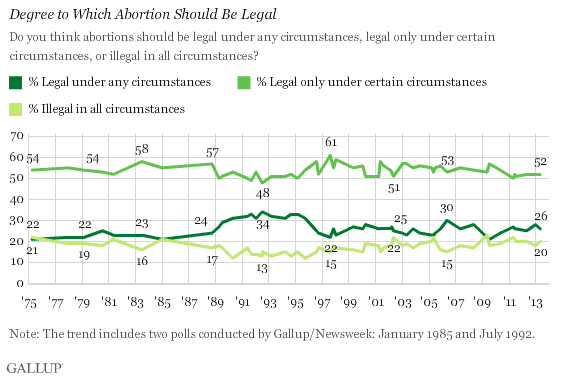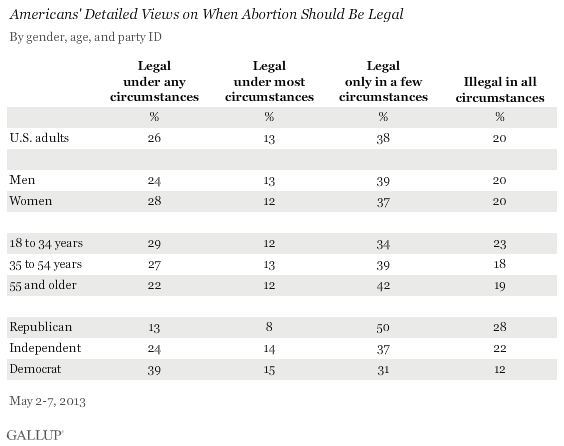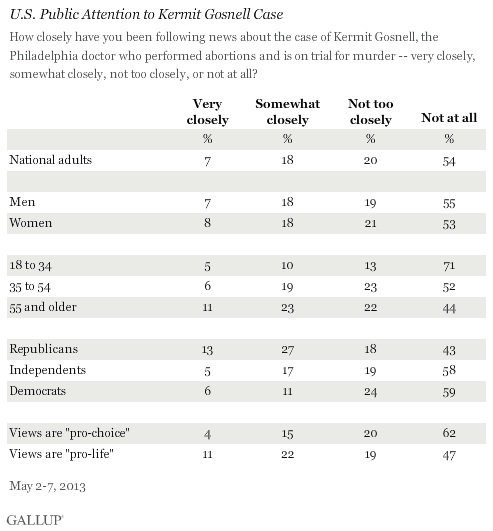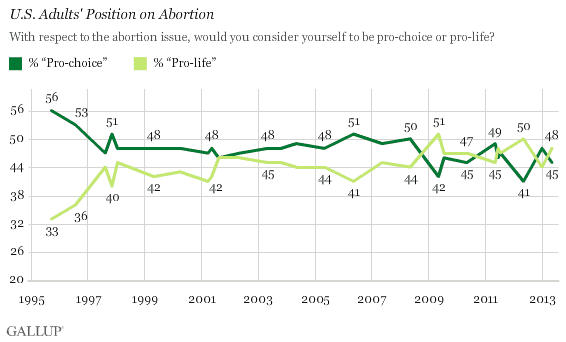PRINCETON, NJ -- As Philadelphia abortion doctor Kermit Gosnell awaits the jury verdict in his capital murder trial, Gallup finds 26% of Americans saying abortion should be legal under any circumstances and 20% saying it should be illegal in all circumstances. The majority, 52%, opt for something in between, as has been the case in nearly every Gallup measure of this question since 1975.

Current views on the legality of abortion, based on Gallup's annual Values and Beliefs poll, conducted May 2-7, are nearly identical to those from Gallup's prior measures in December and May 2012. More generally, they are similar to what Gallup has found for most of the past decade, except for a brief period between 2005 and 2006, when the balance of the two absolutist positions tilted more heavily in favor of abortion being legal in all circumstances.
Gallup poses a follow-up question of respondents who opt for the middle position -- those saying abortion should be "legal only under certain circumstances" -- asking if it should be legal in most or in only a few circumstances. The responses break nearly 3-1 in favor of the more restrictive policy.
The resulting distribution of views shows 26% of Americans favoring legalized abortion under any circumstances, 13% favoring legality under most circumstances, 38% favoring it in only in a few circumstances, and 20% saying it should be illegal in all circumstances.

Americans Paying Little Attention to Gosnell Case
The Philadelphia case centers on charges that Gosnell killed newborns that survived after he attempted to perform late-term abortions, as well as the death of a woman under his care.
Although the latest Gallup survey was conducted after much of the testimony in this trial had already been reported in the news, the stability in Americans' views about the legality of abortion suggests the trial has not swayed public opinion. Part of the reason could be that relatively few Americans are paying attention to it.
One-quarter of Americans say they have followed news of the case either very closely (7%) or somewhat closely (18%), but that is well below the 61% average level of attention Americans have paid to the more than 200 news stories Gallup has measured since 1991. An additional 20% of Americans say they are following it "not too closely" while 54% say "not at all." This makes the Gosnell case one of the least followed news stories Gallup has measured.
Republicans, as well as Americans describing themselves as "pro-life" on abortion, are somewhat more likely to report having followed the case closely than are Democrats, independents, and "pro-choice" Americans.

It is not clear from the data whether Americans' relatively low attention to the Gosnell case reflects a lack of interest in it, or a lack of coverage by the mainstream media. However, nearly half of those following the case, 46%, say the media have not devoted enough coverage to it. That compares with 20% saying the media have devoted too much coverage and 27% saying the right amount.
The strong tilt toward saying there has not been enough coverage as opposed to too much coverage partly reflects the heavy representation of pro-life respondents among those who were asked the question.
![(Asked of those following the Gosnell case very, somewhat or not too closely) Do you think the news media have devoted -- [ROTATED: too much coverage to the Gosnell case, the right amount of coverage, (or) not enough coverage to the Gosnell case]? May 2013 results](http://content.gallup.com/origin/gallupinc/GallupSpaces/Production/Cms/POLL/oumm3ygm40a9myuhnyxt-w.gif)
Americans Still Divide About Equally Into "Pro-Life" and "Pro-Choice" Camps
The Gallup survey also includes an update of Americans' self-identification as either "pro-choice" or "pro-life." The public is about evenly divided, with 48% calling themselves pro-life and 45% pro-choice.
Except for one poll a year ago when the pro-life view was significantly higher, Americans have been closely split on this question continuously since mid-2009. This contrasts with much of 1995-2001 and 2006-2008, when the pro-choice position was more dominant.

Bottom Line
Abortion remains an issue that closely divides Americans in their basic outlook as either "pro-choice" or "pro-life" and engenders fairly similar proportions of Americans taking the more absolutist positions on either side of the legality question. However, the majority of Americans fall in the broad middle, saying abortion should be legal, but only under certain circumstances. Gallup's extensive measurement of abortion attitudes over the years documents the nuances of public opinion on the issue.
One of the clearest messages from Gallup trends is that Americans oppose late-term abortion. As a result, the publicity surrounding Congress' attempt in 1997 to ban a particular late-term abortion procedure known as partial-birth abortion likely caused more Americans to identify as pro-life. However, despite the news that Gosnell may have murdered newborns in the course of performing late-term abortions, public attitudes on abortion are essentially unchanged. Whether views would shift if more Americans become familiar with the case isn't clear, but will be evident if the eventual verdict sparks a major expansion of news coverage.
Survey Methods
Results for this Gallup poll are based on telephone interviews conducted May 2-7, 2013, with a random sample of 1,535 adults, aged 18 and older, living in all 50 U.S. states and the District of Columbia.
For results based on the total sample of national adults, one can say with 95% confidence that the maximum margin of sampling error is ±4 percentage points.
For results based on the total sample of 784 adults who are following the Gosnell case, one can say with 95% confidence that the maximum margin of sampling error is ±4 percentage points.
Interviews are conducted with respondents on landline telephones and cellular phones, with interviews conducted in Spanish for respondents who are primarily Spanish-speaking. Each sample of national adults includes a minimum quota of 50% cellphone respondents and 50% landline respondents, with additional minimum quotas by region. Landline telephone numbers are chosen at random among listed telephone numbers. Cellphone numbers are selected using random digit dial methods. Landline respondents are chosen at random within each household on the basis of which member had the most recent birthday.
Samples are weighted to correct for unequal selection probability, nonresponse, and double coverage of landline and cell users in the two sampling frames. They are also weighted to match the national demographics of gender, age, race, Hispanic ethnicity, education, region, population density, and phone status (cellphone only/landline only/both, cellphone mostly, and having an unlisted landline number). Demographic weighting targets are based on the March 2012 Current Population Survey figures for the aged 18 and older U.S. population. Phone status targets are based on the July-December 2011 National Health Interview Survey. Population density targets are based on the 2010 census. All reported margins of sampling error include the computed design effects for weighting.
In addition to sampling error, question wording and practical difficulties in conducting surveys can introduce error or bias into the findings of public opinion polls.
View methodology, full question results, and trend data.
For more details on Gallup's polling methodology, visit www.gallup.com.
